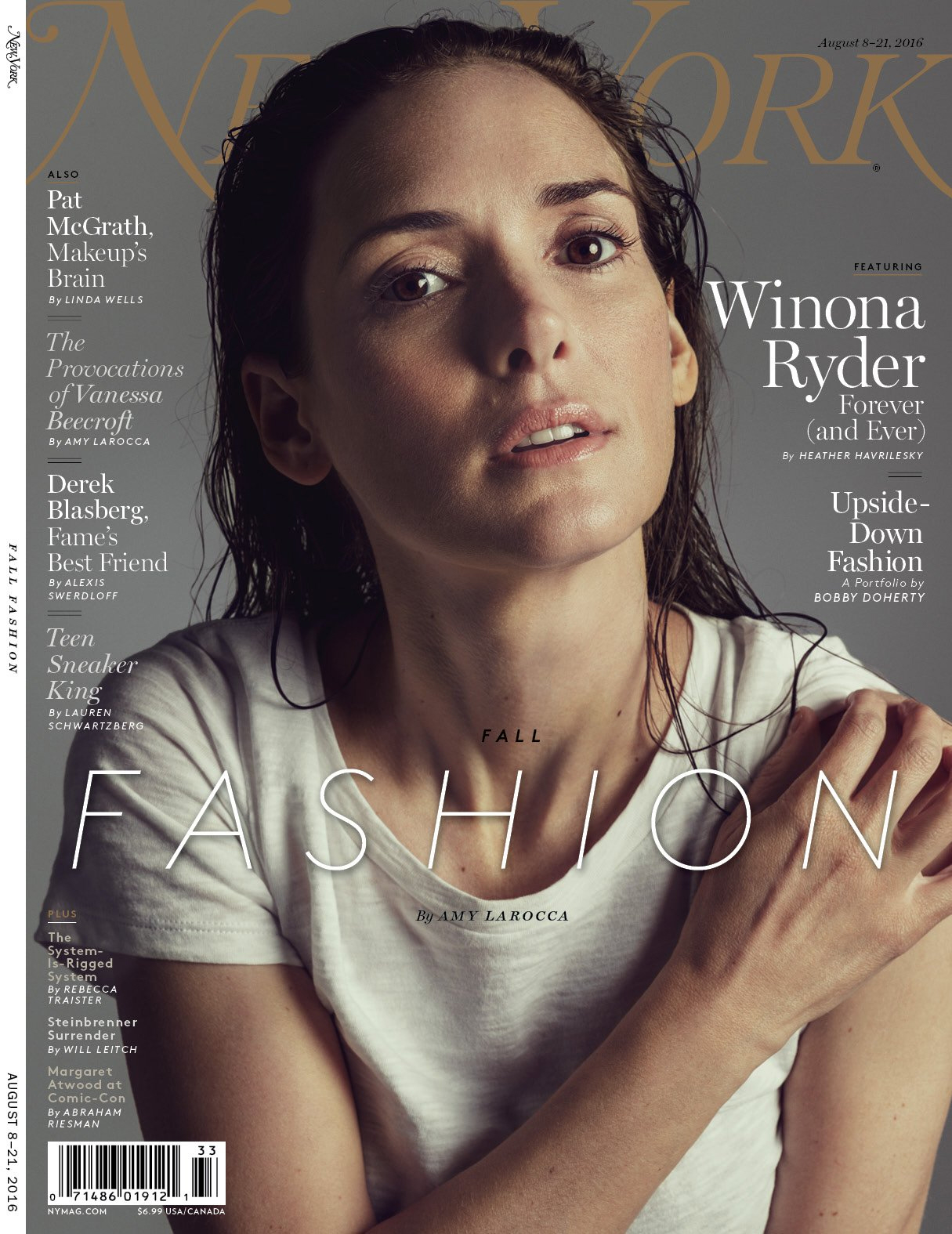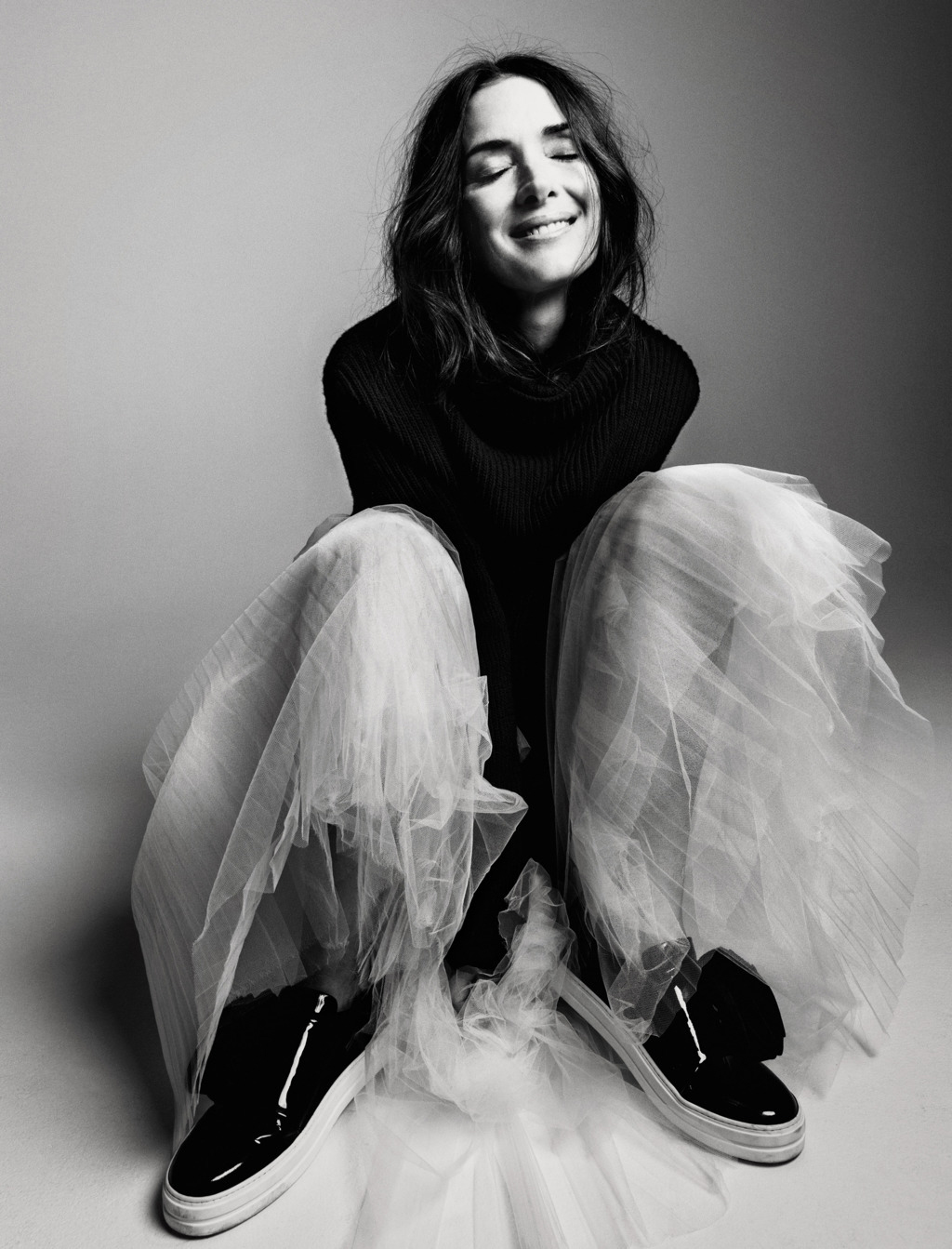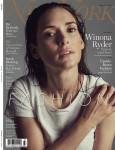Winona Ryder covers the latest issue of New York Magazine, following what can only be considered a “Winona Revival.” Winona got largely great reviews for her role in Stranger Things, which is the latest TV-show obsession. So now Winona, at the age of 44, has another chapter in her career. That’s what this NY Mag piece is about, how Winona was always cool before we realized it. That she was the original Manic Pixie Dream Girl, that she destigmatized her own depression and anxiety before those were the celebrity-causes du jour. She was vintage and one-of-a-kind and individual before we knew we wanted that. Winona IS forever. You can read the full piece here. Some highlights:
How society pathologizes women’s emotions: “I’m so sick of people shaming women for being sensitive or vulnerable. It’s so bizarre to me.”
Playing a mother despite not having kids: “I’m getting asked a lot, ‘You don’t have kids, so how do you know how to act like a mother?’ I know nothing could compare, and I haven’t had that experience, but when my niece was born, I felt like I would jump in front of a car and die for this little person I didn’t even know yet.” Ryder pauses, then returns to talking about her character, Joyce Byers, a store clerk with a deadbeat ex who’s unraveling from frustration and grief. “I actually felt tremendous compassion for her. I feel like she was one of these people that had dreams [for her life]. But she had kids. And it made me think of all the women that I know who have kids, who when they talk about [anything negative about their lives as mothers], they always say, ‘But I love my kids, I wouldn’t trade them for the world.’ Like they feel guilty for even hinting that they’d want something outside of kids! It’s a weird thing.”
Sensitive and fragile: “I wish I could unknow this, but there is a perception of me that I’m supersensitive and fragile. And I am supersensitive, and I don’t think that that’s a bad thing. To do what I do, I have to remain open… There’s a line in the show where someone says [of her Stranger Things character], ‘She’s had anxiety problems in the past.’ A lot of people have picked up on that, like, ‘Oh, you know, she’s crazy.’ And I’m like, ‘Okay, wait a second, she’s struggling.’ Two kids, deadbeat dad, working her ass off. Who wouldn’t be anxious? Even that word, anxious. It’s a bad word. And so like all of these words — it’s kind of what I tried to do with Girl, Interrupted, and why I was so invested in that book and trying to get it made [as a movie]. My whole point was, this happens to every girl, almost.”
Opening up about her depression & anxiety at an early age: “I remember I did Diane Sawyer, and I talked about my experiences with anxiety and depression when I was that age. And I think by doing that, maybe coupled with my physical size, there’s this ‘crazy’ thing. And I’ve realized recently it’s literally impossible to try to change that story…I’ve always been super-private and protective of certain experiences and certain friends. I don’t regret opening up about what I went through [with depression], because, it sounds really cliché, but I have had women come up to me and say, ‘It meant so much to me.’ It means so much when you realize that someone was having a really hard time and feeling shame and was trying to hide this whole thing … And even the whole, like, sensitive, fragile thing. I do have those qualities, and I just don’t think there’s anything wrong with them. There were times when I let it feel too overwhelming and almost, like, shamed, but I had to just get over that.”
Her break from Hollywood: “I did get a chance to explore during my ‘hiatus.’ I was really lucky, because when all you’ve done is this one thing, you become sort of insecure because this town can be isolating and you don’t feel like you’re capable of doing other things.” She says she got “really into constitutional law for a while and really into linguistics and etymology for a while.”
On social media: “I’m not on social media. I don’t actually know how to use it.”
Spending time in her own head: “I have that weird archivist gene–slash–hoarder gene where I keep everything, like every journal. And I think, Do I even want this to exist? But it is sort of interesting to go back and read them. And then all my books … It’s a struggle because it can get — I can overdo it. Between books and then great shows and nowadays you can watch films instantly — I just discovered that same-day-release thing. But I’ve always been that way. Both of my parents are kind of like that, I don’t know. I’ve always been very nocturnal.”
She also tells a confusing story about how a fan – I think? – came up to her when she was with her parents and called her a C-U-Next-Tuesday. Which is bizarre. As for the rest of it, I’ve never really thought about how Winona was the first one, the original, and all of the Kristen Stewarts and Rooney Maras and Zooey Deschanels and yes, even the Carey Mulligans are all sort of following in Winona’s path. Winona is the archetype! I don’t think there’s anything wrong with being sensitive and fragile either, although I do think that Winona does spend too much time in her own head, which she freely admits.
Photos courtesy of Norman Jean Roy/NY Mag.















Love her! What will always baffle me to no end, though, is how journalists ask actors “how can you play a *insert character here* when you’re not one?” Um, well, because I happen to be an actor?
Exactly, actors are supposed to “act”, not all of them need to sleep in a carcass, eat raw bison meat or send rats to get into character.
To be fair, this is not a women thing. Sure, we get called sensitive sooner than men because … well, I don’t know, we have priods I guess? Those pesky hormones. But truly being sensitive and vulnerable, where it’s not an accusation, is not a great thing for men either. It’s always viewd as weak.
I love her, she is one of those actors who just bring a certain energy and charisma to the screen. Even if she’s acting in an Adam Sandler movie. But a girl’s gotta eat, no shade whatsoever. Haven’t watched the show yet but I will.
Re: shaming of sensitivity and vulnerability: I think it’s more of a shaming of what’s considered feminine traits.
On a shallow note: she never aged, dang!
Oh yes it is specifically a woman thing historically speaking. The word hysteria is synonymous with uterus because women were thought to be prone to emotional problems soley because they are women. We still live with that mysogony in our culture.
Women have historically been shamed for “hysterics” but I think being sensitive and vulnerable, which are perceived as more gentle qualities in the vein of nurturing, are considered rather virtuous qualities when attached to females. I think if she said women are shamed for being over-emotional or expressing anger, that would have made more sense. Maybe she used the wrong word choice.
I think men who are described as “sensitive” are generally mocked.
In her case, I don’t remember her specifically being described as either over-emotional or angry or even vulnerable or sensitive. The only time I can remember people thinking she might actually be “crazy” was when she shoplifted. That’s what set the ball rolling for her in people questioning that something might be wrong with her, not her alleged appearance of sensitivity and vulnerability (which are qualities all actors, male and female, have to possess. It wouldn’t make sense to be an actor if you don’t have the ability to express outward emotion).
I’m going off on a tangent, but during the Girl, Interrupted era when she made her admission of depression and anxiety, I remember everybody turning their attention to Angelina Jolie. Everybody seemed more interested in Jolie than what Ryder had to say about her private life.
Yes but how are sensitive men mocked? They are feminized (called p**sys etc) it all comes down to mysogony and homophobia.
My love for her is growing and growing. WINONA FOR EVER!!!!
More Winona stories please! I greatly appreciate her candor about her struggles with anxiety and depression. It’s a real thing that many women go through and it shouldn’t be looked at as shameful. Also, loved your thought about her being the archetype for other moody actresses. She’s so lovely!
Whistle for Winona!
Love me some Winona. Always have, always will. I commented on a earlier post about Stranger Things that I was bummed about her overacting in the show. I was only 2 episodes in at that point and was hoping it/she would get better. Another commenter advised me to hang in, it would get better. So a big thank you to that person! The show got better and so did Winona. In a big way. She got so much better that I would have believed she was a parent IRL if I didn’t know better.
i love her. and tbh is so true that nowadays the attitude towards mental illness has changed and we’re much more aware, she was being incredibly brave talking about it back then, and she got labelled ‘crazy’.
She’s right that the majority of young females do have some level of anxiety. Back in the early 19th century, young women were going off to college for the first time in history and had no coping skills for being packed up and sent to live on their own with no family or fiends all in one fell swoop. They were misdiagnosed as having “female hysteria” and in many cases, were actually committed to mental institutions. Shame on a young lady growing up sheltered and then simply being scared of being alone in the world for the first time and not having been forewarned or taught anything about what that might be like beforehand – just be grateful you got a chance at higher education. Cybil (the famous multiple personality case) was seriously diagnosed as having female hysteria when she started showing symptoms of her split personalities. A well-accepted theory behind female hysteria was that these women were sexually frustrated, so a common practice was to perform complete hysterectomies on these women. I know it was a long time ago, but the men and the brains coming up with this stuff is just so self-serving and misogynistic, I still can’t believe they could take themselves seriously with their lines of thought. Glad I live in the 20th century.
We’re in the twenty first century! Have been here for the past sixteen years, mate.
I grew up in the 20th century but am now in the 21st century. Poor grammar on my part.
It’s also how the vibrator was created. A woman would go to her doctor who would use a vibrator on her. You can’t make this stuff up.
this argument always surprises me.only a negligible percentage of men went to college in 19 the century.
What an excellent interview.
Mostly tho I just <3 celebitchy so much, thanks for this writeup Kaiser. So much vitality is given to women's voices here.
Winona full of it as usual. Its not clear to me if she is talking about personality types or mental health with that statement but she is dead wrong on either count. Society shames women for NOT being sensitive and vulnerable, while shaming men for being so. Pretty petite girls who are also vulnerable bring out nurturing instincts in women and protective instincts in men. Its the women who are not “sufficiently emotional” who get slammed for being b*tches. And if she is speaking about the stigmatisation of mental illness then she needs to drop the gender distinction. That stigma runs far deeper among men.
No, she’s correct as much as you are. When women share their struggles, they’re often shot down for being dramatic and looking for attention. A woman talking about mental health is categorized as The Crazy Girl, or Hot But Crazy, and dismissed on those grounds. Like that guy in Girl Interrupted said, “everyone’s sad” — this is what women and men often hear when they talk to someone who doesn’t understand depression or anxiety.
Society expects women to be sensitive and vulnerable all the time, but then uses it against women as well, claiming we’re too emotianal for centrain jobs and certain positions. You just can’t win if you’re a woman.
I am sometimes worried about the portrayal of mental illness in the media. It’s either portrayed as something shameful and horrible, or there is a certain glamourisation of it. People (mostly women, ALWAYS attractive) with a mental illness are portrayed as being interesting or having an edge, which also isn’t good.
Yes to this. I agree we women can’t seem to win for losing when it comes to our emotional or chemical makeup. I chalk it up to the fact that we use more of our brain than men do, so they just don’t comprehend our spectrum. I don’t mean that malicious or to put down men. It’s a science approach that helps me be more patient with men’s lack of understanding. If they don’t feel it, how would they get it?
Yeah, I couldn’t tell if she was talking about mental health either. I think I perceive being clinically depressed or anxious (which can be attributed to chemical imbalance) as being distinct from being sensitive and vulnerable (which does seem to be more about personality). And I also think of clinical depression as being gender-neutral — it can afflict anybody at any time and is unpredictable in when it can strike. I’ve also never gotten the impression that anybody of any gender really wants to admit publicly that they have a mental health issue.
Agree w you, Naya. And I’m also sick of Winona Ryder pretending to be so “fragile.” She did not make it in Hollywood on fragility and anxiety, but if she did, it’s b/c fragile and sensitive IS an acceptable way for women to be seen as in society, esp small, petite, attractive women—like Winona. Her youthful looks and gamine appearance have NEVER worked against her—and I don’t think she was the archetype for that look, either. I think it was Audrey Hepburn—who I like much, much more than disingenuous Winona.
What did she do with constitutional law?
Winona is the archetype. And Stranger Things has me dazzled. I am in love. Netflix is my church. As for being sensitive-yes you can see it in her. It is her. The only other actresses I ever saw that in to her level are Naomi Watts and Bette Davis. But Davis was more frenetic. Her performance as QE1 was stunning.
I LOVE Winona and her style. She was OK in Stranger Things, which I’m ambivalent about. It was enjoyable for nostalgia reasons but take that away and honestly the series wasn’t particularly well written or exceptional. It’s decorated with Stephen King references, but hanging my pathetic christmas tree with the same ornaments doesn’t make it the Rockefeller christmas tree. And Winona’s one note choices started to bug me after a while. The girl who played Eleven was amazing though, really looking forward to her career.
She is absolutely right!
Women are told not to cry at work, not to be too soft, that it’s “unprofessional.” Yet we’re supposed to comfort everyone and be sensitive to everyone else.
OR, the workforce could accommodate natural human behaviors shared by the majority of the population.
Love Winona.
Kristen Stewart and Rooney Mara don’t have a fraction of the charisma or screen presence Winona Ryder has. I can more readily understand the Zooey Deschanel and Carey Mulligan examples (Cutesy and Moody versions of Winona perhaps?), but I still don’t think they have the same “it” factor that she has or had.
I actually think Rooney is failry similar. She is a good actress when pushed. Zoey not so much.
And I prefer Carey to Winona. Carey Mulligan is in a league of her own.
Winona is breath taking.
I find her to be one of those actors or actresses that you can’t take your eyes away from. She’s a scene stealer.
Haven’t seen her new stuff. She ruined “The Crucible,” “The Age of Innocence,” and “Dracula” with her shitty acting. Can’t rewrite history. She can’t do accents or period pieces. God help us all when she tries both at once.